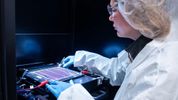Electric vehicle (EV) batteries are known for being tough to recycle, but as demand for the rare metals inside them continues to grow, innovative solutions are emerging to recover these valuable materials from used power cells.
Standing in a lab where batteries undergo a remarkable transformation. But first, they must be reduced to scrap.
What enters this facility is a dark, powdery substance known as "black mass" – the result of pulverizing batteries until they are nearly unrecognizable. Each particle in this mass measures less than a millimeter. The team at Altilium, a recycling company based in the southwest of England, is tasked with extracting valuable materials from this blackened mixture.
While the powder contains a mix of plastics and steel from the battery casing, it also holds prized materials like lithium, nickel, cobalt, and graphite. These are the key ingredients that workers in the lab can use to create new batteries.
As the climate crisis worsens, the world is moving toward electrification. Countries are increasingly shifting away from fossil fuels to renewable energy sources such as solar and wind power. Homeowners are replacing old gas and oil boilers with heat pumps, and more drivers are choosing electric vehicles (EVs) powered by batteries.
According to the International Energy Agency (IEA), nearly 20% of all cars sold in 2023 were electric. This marked a 35% increase compared to the previous year, bringing the total number of EVs on the road to 40 million. However, this growth also means that the demand for batteries, and the materials needed to produce them, is skyrocketing.
"One of the biggest challenges is that these minerals are concentrated in just a few regions," says Christian Marston, president and COO of Altilium. Over half of the world's nickel comes from Indonesia, and two-thirds of cobalt is sourced from the Democratic Republic of Congo—both areas plagued by ongoing human rights concerns tied to mining operations.
This has sparked a race to find alternative ways to source these critical minerals. Recycling batteries is one promising option, but it's notoriously challenging. However, the team at Altilium believes they’ve found a solution.
The powder contains some plastic and steel from the battery which must be separated out, but there are also sought-after materials such as lithium, nickel, cobalt and graphite. These are the prized ingredients with which the lab workers here can make a new battery.
https://www.bbc.com/future/article/20250404-where-ev-batteries-go-to-die-and-be-reborn
















